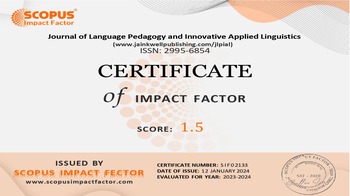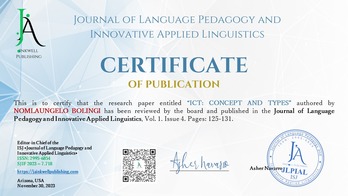The Importance of Phenomenology and Phenomenon-Based Approach in the Process of Teaching Foreign Languages
DOI:
https://doi.org/10.1997/zebaw586Keywords:
problem – based, phenomenology, teaching process, real-life situations, authentic, holisticAbstract
Phenomenon based teaching is an innovative pedagogical approach that emphasizes experiential learning through real-world phenomena. It encourages students to actively engage in the learning process by immersing themselves in authentic, contextualized scenarios. By integrating technology, PBL offers unique opportunities to enhance learning as well teaching by providing dynamic auditory experiences and tailored feedback.
Downloads
References
Biesta, G. J. (2009). What is at stake in a pedagogy of interruption? In T. E. Lewis.
J.G.A. Grinberg, & M. Laverty (Eds.), Philosophy of Education: Modern and Contemporary Ideas at Play (pp. 785–807). Dubuque, IA: Kendall/Hunt.
Biesta, G. J. (2012). Giving Teaching Back to Education: Responding to the Disappearance of the Teacher. Phenomenology & Practice, 6(2), 35–49.
Eurydice (2015). Finland: Ongoing Reforms and Policy Developments. Retrieved October 4, 2016, Finland: Ongoing_Reforms_and_Policy_Developments. Finnish National Board of Education (FNBE). (2004). National Core Curriculum for
Basic Education 2004. Helsinki: Finnish National Board of Education.
Finnish National Board of Education (FNBE). (2016). National Core Curriculum for Basic Education 2014. Helsinki: Finnish National Board of Education.
Hakkarainen, K. (2003). Emergence of progressive-inquiry culture in computer-supported collaborative learning. Learning Environments Research, 6, 199–220.
Halinen, I. (2014, June 13). General Aspects of Basic Education Curriculum Reform.
Silander, P. (2015a). Digital Pedagogy. In P. Mattila, & P. Silander (Eds.), How to create the school of the future: Revolutionary thinking and design from Finland (pp. 9-26).
Silander, P. (2015b). Rubric for Phenomenon Based Learning. Retrieved October 5, 2016
Downloads
Published
Issue
Section
License
Copyright (c) 2023 Khilola Khusanova (Author)

This work is licensed under a Creative Commons Attribution 4.0 International License.












